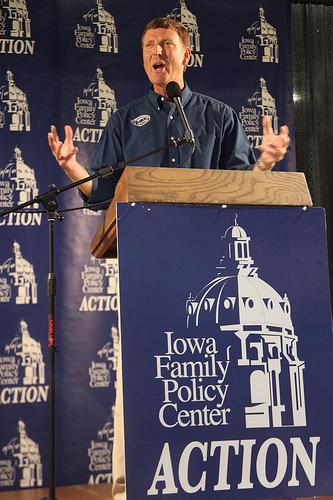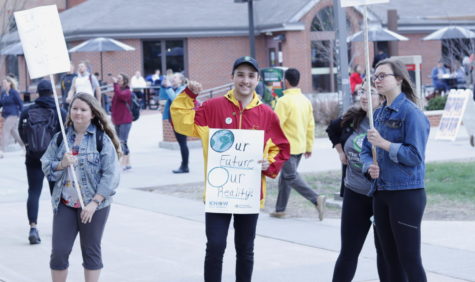Vander Plaats campaign politicizes Iowa judicial branch

Bob Vander Plaats speaking at an Iowa Family Policy Center event
August 27, 2010
After losing his third run to become the Iowa GOP gubernatorial candidate, Bob Vander Plaats launched a campaign to unseat three of the Iowa Supreme Court justices up for a retention vote in November.
“I believe this election to unseat these three justices may be, if not one of the most, the most important campaign and election in the entire country,” Vander Plaats said when he made the announcement on Aug. 6. “We will be unleashing a full effort and campaign in the next coming weeks.”
Vander Plaats kept silent after former Iowa Gov. Terry Branstad, and current Republican gubernatorial candidate, did not select him as a running mate. Prior to the announcement of the campaign against judicial retention for the three justices in November, speculation of a Vander Plaats independent run remained since he declined to endorse Branstad’s candidacy.
On the ballot this year are two Democrat appointees in David Baker, by Gov. Chet Culver, and Michael Streit, appointed by Tom Vilsack. But it also includes Branstad appointee Marsha Ternus, the chief justice.
His newly launched campaign Iowa for Freedom, on which he serves as chairman, gathered Chuck Laudner as campaign manager. Laudner is the former executive director of the Republican Party of Iowa and chief of staff for Rep. Steve King (R-Iowa).
Iowa for Freedom turns out to be partly financed by the American Family Association, which in the past organized boycotts of popular television shows like “Nightline,” “Rosanne” and “Saturday Night Live” because it deemed them to be a “threat to family values.” In 2001, the AFA accused the National Parent-Teacher Association of promoting homosexuality to children.
The AFA protested countless major corporations for various reasons and claimed the cartoon movie “Shark Tale” to be about promoting gay acceptance to children. The group also claimed Adolf Hitler was gay, compared homosexuality to terrorism and said it’s responsible for Biblical plagues.
The justices were part of a unanimous April 2009 decision declaring the state ban on same-sex marriages to be unconstitutional. Because it was based on the state’s constitution, rather than the United States’, the case could not be appealed.
By formerly organizing a campaign to unseat the justices, it allows each judge to form their own Political Action Committee to defend themselves — a prospect some, like the non-partisan Iowans for Fair and Impartial Courts, argue further politicizes the judicial branch of government.
“If you look at special interest money flowing into judges’ campaigns in other states — are citizens really getting a fair day in court?” said Norbert Kaut, a Des Moines-based attorney and spokesman for IFIC. “Iowa’s long history of keeping campaign money out of the selection and retention of judges has helped us earn a reputation as having some of the best state courts in the country.”
Kaut’s comment comes after a report by the Brennan Center for Justice found a significant increase in special interest spending in court races across the county. They more than doubled from $83 million spent from 1990-99 to more than $206 million from 2000-09 and an estimated $93.6 million spent during the same decade for broadcast time for high court candidate TV ads.
That caused former U.S. Supreme Court Justice Sandra Day O’Connor, who will appear in Des Moines on Sept. 8, to speak out against the politicizing of judicial branches.
“The crisis of confidence in the impartiality of the judiciary is real and growing,” O’Connor said in the forward of the report. “Left unaddressed, the perception ‘justice is for sale’ will undermine the rule of law that the courts are supposed to uphold.”
O’Connor said in the report whether the money actually influences the judicial branch may not be the issue because the public will begin to suspect it does.
Opponents of same-sex marriage have publicly labeled courts like Iowa’s and the California district court, which delivered a decision ruling Proposition 8 federally unconstitutional, as “activist” courts stepping out of their bounds.
“Iowans across the state shared their concerns with me at the State Fair,” Vander Plaats said Wednesday. “They applaud Iowa For Freedom’s effort to take a stand against activist judges who jeopardize their freedoms and liberties protected by the Constitution.”
Tuesday the conservative Iowa Family Policy Center released its results from an unscientific poll conducted during the 2010 Iowa State Fair concerning judicial retention and other November votes. The IFPC said when it came to votes on the judicial retention election, 77.9 percent voted “no” on retention, while 22.1 percent voted “yes.”
IFPC Action President Chuck Hurley said Tuesday, “Many fair attendees expressed strong feelings over the unconstitutional actions of our current Supreme Court, and the numbers seem to reflect the energy they have for casting a ‘no’ vote in the retention election this November.”
The unscientific poll was conducted with votes cast by placing a quarter in a gallon jug representing each participant’s choice. Fair attendees were able to participate regardless of age or state of residence, the IFPC said. Vander Plaats quickly said the poll proves Iowa for Freedom would succeed on Nov. 2.
Branstad received 55.2 percent support in the IFPC poll against Culver and independent candidate Jonathan Narcisse. Branstad signed the original state Defense of Marriage Act during his last year in office in 1998, which the Iowa Supreme Court ruled unconstitutional.
The overturning of the same-sex marriage ban in the unanimous ruling in Varnum v. Brien sparked outrage among opponents immediately. Every candidate who ran for the GOP nomination for governor made repealing same-sex marriage rights a priority.
But whether same-sex marriage will sway voters toward a vote against retention or in favor of any candidate is not certain. A KCCI TV-8 scientific poll in June found 53 percent of Iowans supported same-sex marriage while only 41 percent opposed.
The Iowa Judicial Branch website has the biographies of the 74 judges up for election or retention this fall. They said more information would come to voters in early October when the Iowa State Bar Association releases the results of a survey of Iowa lawyers.
Iowa Courts
— The way Iowa’s high court appointments work is a nonpartisan commission screens and interviews applicants before forwarding a slate of nominees to the governor in office for his selection. They are then on a cycle to come up for retention at the end of their term and in the first general election following their appointment. This process has been in place since voters passed an Iowa constitutional amendment in 1962 to replace a popular vote for each justice.
— The U.S. Chamber of Commerce ranks Iowa’s court system as one of the top five in the nation.
— The Iowa ruling does not force churches to recognize same-sex marriages and maintains a church’s right to decide who can be married under its roof.
— The ban on same-sex marriage was originally granted a summary judgment in a Polk County District Court by Robert Hanson in August 2007. Six same-sex couples filed suit against Timothy Brien, Polk County Recorder, for refusing to grant marriage licenses to them. The case was appealed to the Iowa Supreme Court and a unanimous ruling found the ban out of line with Iowa’s state constitution. Bob Vander Plaats said he does not intend to put his efforts toward ousting Hanson.
















